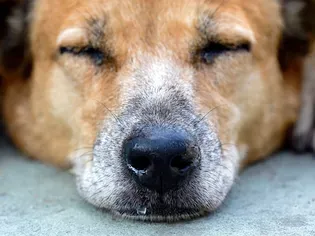Reasons Why Your Dog Has a Runny Nose
Updated on 04/26/24

Unveiling the Enigma: Understanding the Causes of Your Dog's Runny Nose
A dog's runny nose can be an unsettling sight, leaving owners perplexed and worried. From harmless allergies to more serious conditions, the reasons behind this nasal discharge can vary immensely. To provide comprehensive insights, this blog delves into the various causes of a runny nose in dogs, shedding light on their symptoms, diagnosis, and potential remedies.
1. Allergies and Irritants: The Itch Within
Just like humans, dogs can suffer from allergies, triggering their immune system to overreact to certain substances. Common allergens include pollen, dust, mold, and certain foods. When a dog inhales or comes into contact with an allergen, their nasal passages become irritated and inflamed, leading to a runny nose and other symptoms such as sneezing, watery eyes, and itching.
Example: A dog that suddenly develops a runny nose while out on a walk in a field may be allergic to the grass pollens present in the air.
2. Infections: Battling the Microbial Invaders
Upper respiratory tract infections (URIs), often caused by viruses or bacteria, can also trigger a runny nose in dogs. These infections irritate the nasal passages, causing inflammation and increased mucus production. Common symptoms of a URI include sneezing, coughing, lethargy, and decreased appetite.
Example: If your dog's runny nose is accompanied by a fever, lethargy, and coughing, it may have a bacterial infection that requires veterinary antibiotics.
3. Nasal Foreign Bodies: The Unwanted Guest
Occasionally, a foreign body, such as a piece of grass or a toy, can lodge in a dog's nasal passage, causing irritation and inflammation. This can lead to a persistent runny nose, sneezing, and difficulty breathing.
Example: If your dog has been chewing on a stick or playing outdoors and suddenly develops a runny nose, it's crucial to check for any foreign objects lodged in its nostrils.
4. Dental Disease: The Oral Connection
Dental problems, such as infected teeth or gum disease, can also cause a runny nose in dogs. Bacteria from the mouth can travel up the nasal passages, leading to inflammation and mucus production.
Example: If your dog's runny nose is accompanied by bad breath and difficulty eating, it's important to have its teeth examined by a veterinarian.
5. Nasal Tumors: A Rare but Serious Concern
In rare cases, a runny nose in dogs can be a sign of a nasal tumor. These tumors can block the nasal passages, causing difficulty breathing and discharge. Other symptoms may include facial swelling, eye problems, and neurological signs.
Example: If your dog's runny nose is persistent, bloody, and accompanied by other unusual symptoms, it's imperative to seek immediate veterinary attention.
6. Trauma and Injuries: The Impact of Mishaps
Trauma or injuries to the nose, such as a fall or a dog fight, can also cause a runny nose. The damage can result in inflammation, bleeding, and mucus production.
Example: If your dog has a recent history of trauma or injury, it's important to monitor its nasal discharge and seek veterinary attention if it persists.
7. Idiopathic Rhinitis: The Mystery Unraveled
In some cases, a dog's runny nose may have no identifiable cause. This condition, known as idiopathic rhinitis, is characterized by chronic inflammation of the nasal passages without any underlying infection or foreign body.
Example: If your dog's runny nose has been present for an extended period and has no obvious cause after thorough veterinary evaluation, it may be diagnosed with idiopathic rhinitis.
When to Seek Veterinary Attention
If your dog's runny nose is persistent, accompanied by other symptoms, or fails to respond to home remedies, it's crucial to seek veterinary attention. Veterinary examination and diagnostics can help identify the underlying cause and determine the appropriate course of treatment.
Conclusion
A runny nose in dogs can be a common occurrence, with varying causes ranging from allergies to infections and foreign bodies. By understanding the different reasons behind this nasal discharge, dog owners can be proactive in monitoring their pet's health and seeking veterinary care when necessary. From identifying allergens to treating infections and managing chronic conditions, this comprehensive guide empowers dog owners with the knowledge to provide the best care for their beloved companions. Remember, a runny nose, though often a nuisance, can provide valuable insights into your dog's overall well-being.
Explore More Pets

Basic Training
Puppy and Baby Introductions

Working Dog Breeds
All About Search and Rescue Dogs

Dog Treatments
Puppy Vaginitis: Signs, Causes and Treatment

Dog Adoption
After More Than 1,200 Days in the Shelter, Coco Goes Home

Basic Training
How to Train Your Puppy to Go on Potty Pads

Hybrid Dog Breeds
The Difference Between a Mutt, Mixed Breed, or Designer Dog?

Dog Treatments
Nail Problems in Dogs

Puppies
7 Reasons Why Two Dogs Are Better Than One